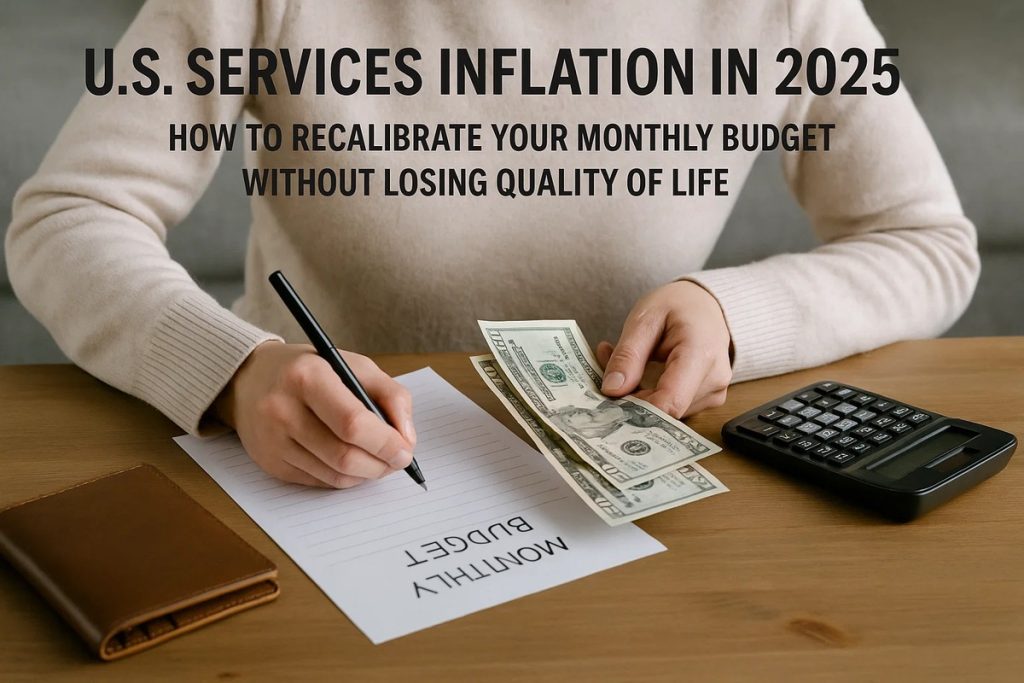In a world where financial stability is increasingly significant, recalibrating your monthly budget in response to service inflation becomes a vital skill. This challenge, faced by many households, can be managed without sacrificing your quality of life.
As we move into 2025, focusing on optimizing your finances is more important than ever. This is a period defined by changing economic dynamics, and being proactive about your monetary health will empower you to enjoy the lifestyle you desire, regardless of external economic pressures.
Navigating service inflation in 2025

The year 2025 presents unique challenges related to the inflation of services, trends that could potentially impact your expenses significantly. Services inflation can be attributed to an array of factors including labor shortages, supply chain disruptions, and increased consumer demand, which, in turn, push service providers to raise prices.
Understanding the specific services most affected by price hikes can guide you in prioritizing your expenditures. Industries such as healthcare, education, and utilities often see notable increases, meaning these areas may need a closer look during budget evaluations. By being informed about these patterns, you stand a better chance of adapting effectively.
Recognizing inflation’s impact on daily life
To respond to rising costs, first recognize how inflation affects your day-to-day activities. The increased costs in services don’t just impact occasional big-ticket items — they infiltrate daily expenses. For example, you might notice your monthly utility bill creeping upwards or your weekly grocery shopping becoming more costly as service providers adjust to their own rising costs.
By identifying these subtle changes early, you can strategize better, ensure you are making the most of your resources, and prevent surprise financial burdens. Detailed tracking of your expenses and measuring them against set benchmarks will help gauge when adjustments are necessary.
Practical strategies for budget recalibration
Recalibrating your budget requires examining both big-picture and detailed elements of your expenses. Begin with an audit of your current spending habits to distinguish between your non-negotiable expenses and discretionary spending. This practice not only highlights potential savings opportunities but also empowers you to prioritize spending on what truly enhances your life.
Setting realistic financial goals based on prioritized expenses is crucial. These should focus on value over volume — understanding that it’s not just about cutting costs but rather maximizing impact. For instance, consider switching to a streaming service plan that offers just the features you use, instead of paying for a premium package with rarely-watched channels.
Simple changes with lasting benefits
Implementing practical adjustments in your budget can have a lasting positive impact. Simple lifestyle changes, such as cooking at home instead of dining out or opting for public transportation over personal vehicle use, can significantly reduce service-related expenses. Subscription audits, discount usage, and bundling services can also yield considerable savings without compromising your lifestyle.
By continuously refining these strategies, you’re not only weathering economic shifts but also establishing a sustainable financial routine that fosters peace of mind and stability. This mindset is invaluable in maintaining and enhancing your quality of life amidst rising costs.
Concluding thoughts on budget management
While inflation can present significant challenges, it also offers an opportunity to reassess and strengthen your financial strategies. By focusing on your finances actively, you assert control over external factors. Adopting these budget management techniques equips you with greater financial resilience, allowing you to sustain and even improve your lifestyle during economically challenging periods.
Through thoughtful planning and strategic decisions, it’s possible to mitigate the impact of inflation on your budget while continuing to enjoy a fulfilling life without unnecessary sacrifices. The key is consistently evaluating your financial practices and adapting to new economic realities with confidence and clarity.

